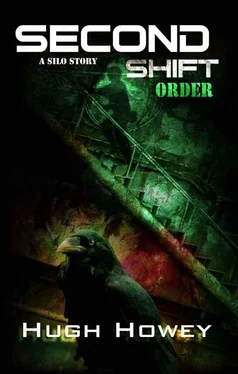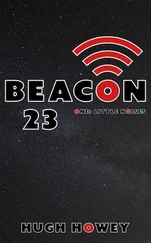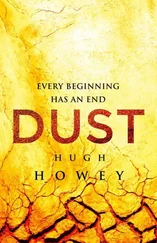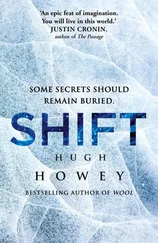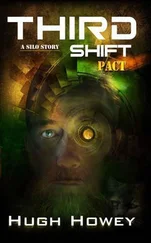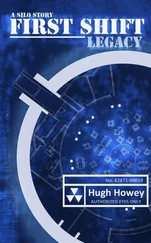It was that night that Anna came to him. After a day of numbness and dwelling on death, of eating the meals brought down by Thurman and not tasting a bite, of watching her set up a computer for him and spread out folders of notes, she came to him in the darkness.
Donald complained. He tried to push her away. She sat on the edge of the cot and held his wrists while he sobbed and grew feeble. He thought of Erskine’s story, on what it meant to do the right thing rather than the correct thing, what the difference was. He thought this as an old lover draped herself across him, her hand on the back of his neck, her cheek on his shoulder, lying there against him while he wept.
A century of sleep had weakened him, he thought. A century of sleep and the knowledge that Mick and Helen had lived a life together. He felt suddenly angry at her. Not at Anna, whose breath he could feel on his neck, but at Helen. Angry at her for not holding out, for not living alone, for not getting his messages and meeting him over the hill where he could store her beauty away forever.
Anna kissed his cheek and whispered that everything would be okay. Fresh tears flowed down Donald’s face as he realized that he was everything Victor had assumed he wasn’t. He was a miserable human being for wishing his wife to be lonely so that he could sleep at night a hundred years later. He was a miserable human being for denying her that solace when Anna’s touch made him feel so much better.
“I can’t,” he whispered for the dozenth time.
“Shhh,” Anna said. She brushed his hair back in the darkness. And the two of them were alone in that room where wars were waged. They were trapped together with those crates of arms, with guns and ammo, and far more dangerous things.
Do not let me fear my death.
I beg you with my final breath.
Take and plant me ‘neath the corn.
Take me, oh Lord, another born.
One for one, as per your plan.
One for one, come take my hand.
Bury me that I’ll take root.
Plant me, oh Lord, and reap your fruit.
— Seth Hayden, age 5
Mission wound his way toward Central Dispatch and agonized over what to do for his friend. He felt afraid for Rodny but powerless to help. The door they had him behind was unlike any he’d ever seen: thick and solid, gleaming and daunting. If the trouble his friend had caused could be read by where they were keeping him—
He shuddered to continue that line of thought. It’d only been a few months since the last cleaning. Mission had been there, had carried up part of the suit, a more haunting experience than porting a body for burial. Dead bodies at least were placed in those black bags the coroners used. There was something good and somber about them. The cleaning suit was a different sort of bag, tailored to a living soul that would crawl inside and be forced to die there.
Mission remembered where they had picked up the gear. It’d been a room right down the hall from where Rodny was being kept. Weren’t cleanings run by the same department? He shivered. One slip of a tongue could land a body out there, rotting on the hills, and his friend Rodny was known to wag his dangerously.
First his mother, and now his best friend. Mission wondered what the Pact said about volunteering to clean in one’s stead. If it said anything at all. Amazing that he could live under the rules of a document that he’d never read. He just assumed others had, all the people in charge, and that they were operating by its contents fairly.
On fifty-eight, a porter’s ’chief tied to the downbound railing caught his attention. It was the same blue pattern as the ‘chief worn around his neck, but with a bright red merchant’s hem. Duty beckoned, dispelling thoughts that were spiraling nowhere. Mission unknotted the ‘chief and searched the fabric for the merchant’s stamp. It was Drexel’s, the apothecary down the hall. Light loads and lighter pay, normally. But at least it was downbound, unless Drexel had been careless again with which rail he tied it to.
Mission was dying to get to Central where a shower and a change of clothes awaited, but if anyone spotted him with a flat pack marching past a signal ‘chief, he’d hear it from Morgan and the others. He hurried inside to Drexel’s, praying it wasn’t a round of meds going to several dozen individual apartments. His legs turned to rubber just thinking about it.
Drexel was at the counter as Mission pushed open the apothecary’s squeaky door. A large man with a full beard and a balding head, Drexel was something of a fixture in the mids. Many came to him rather than to the doctors, though Mission wasn’t sure how sound a choice that was. Often, though, it was the man with the most promises who got the chits, not the one who made people better. And besides, the very worst cases rarely complained. If they did, only the roots heard.
The usual handful of sick people sat on Drexel’s benches in the waiting room, sniffling and coughing. Mission felt the urge to cover his mouth with his ‘chief. Instead, he innocuously held his breath and waited while Drexel filled a small square of paper with ground powder, folding it neatly like one might roll a cigarette, before handing it to the woman waiting. The woman slid a few chits across the counter. When she walked away, Mission tossed the signal ‘chief on top of the money.
“Ah, Mish. Good to see you, boy. Looking fit as a fiddle.” Drexel smoothed his beard and smiled, yellow teeth peering out from cornrows of drooping whiskers.
“Same,” Mission said politely, braving a breath. “Got something for me?”
“I do. One sec.”
Drexel disappeared behind a wall of shelves crammed full of tiny vials and jars. A baby in the waiting room wailed. The apothecary reappeared with a small sack. “Meds for down below,” he said.
“I can take them as far as Central and have Dispatch send them from there,” Mission told him. “I’m just finishing up a shift.”
Drexel frowned and rubbed his beard. “I suppose that’ll do. And Dispatch’ll bill me?”
Mission held out a palm. “If you tip,” he said.
“Aye, a tip. But only if you solve a riddle.” Drexel leaned on the counter, which seemed to sag beneath his bulk. The snifflers and coughers waiting on their meds were ignored, and the last thing Mission wanted to hear was another of the old man’s riddles and then not get paid. Always an excuse with Drexel to keep a chit on his side of the counter.
“Okay,” the apothecary began, tugging on his whiskers. “Which one weighs more, a bag full of seventy-eight pounds of feathers, or a bag full of seventy-eight pounds of rocks?”
Mission didn’t hesitate with his answer. “The bag of feathers,” he declared. He’d heard this one before. It was a riddle made for a porter, and he had thought on it long enough between the levels to come up with his own answer, one different from the obvious.
“Incorrect!” Drexel roared, waving a finger. “It isn’t the rocks—” His face dimmed. “Wait. Did you say the feathers?” He shook his head. “No, boy, they weigh the same .”
“The contents weigh the same,” Mission told him. “The bag of feathers would have to be bigger. You said they were both full, which means a bigger bag with more material, and so it weighs more.” He held out his palm. Drexel stood there, chewing his beard for a moment, thrown off his game. Begrudgingly, he took two coins from the lady’s pay and placed them in Mission’s hand. Mission accepted them and stuffed the sack of meds into his pack before cinching it up tight.
“The bigger bag—” Drexel muttered, as Mission hurried off, past the benches, holding his breath again as he went, the pills rattling in his sack.
Читать дальше
